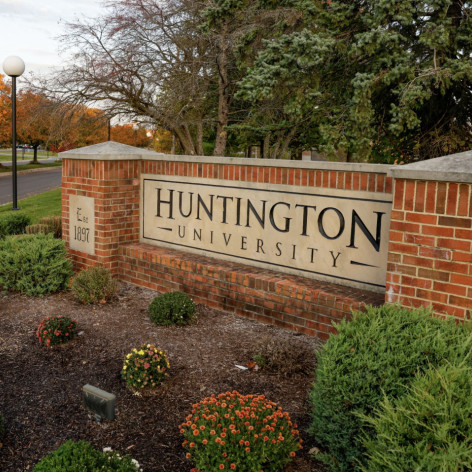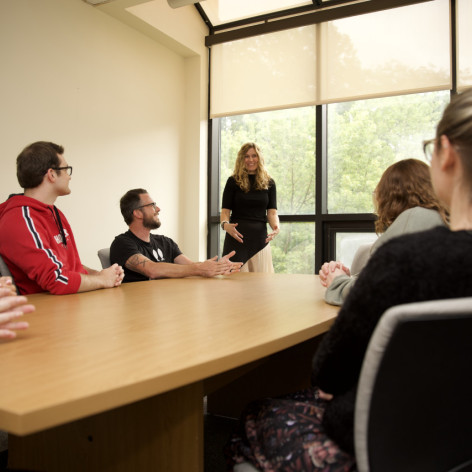At the ‘Core’ of Huntington University
FOR RELEASE: Thursday, January 13, 2011
 My liberal arts education began at the intersection of 18th and Vine, the Jazz District in downtown Kansas City, Mo. As part of a sociology project, I had been assigned a particular ethnic neighborhood in the city, and after meeting with some business owners in the area, a friend and I decided to take in some live jazz at a local club. We found an empty table in the dim, smoke-filled room, two white faces in a sea of dark, and settled in to the smooth notes of a saxophone. Though I never developed a full appreciation for jazz, my experience on 18th and Vine led me to develop an independent study on African-American literature, a subject I later pursued in graduate school.
My liberal arts education began at the intersection of 18th and Vine, the Jazz District in downtown Kansas City, Mo. As part of a sociology project, I had been assigned a particular ethnic neighborhood in the city, and after meeting with some business owners in the area, a friend and I decided to take in some live jazz at a local club. We found an empty table in the dim, smoke-filled room, two white faces in a sea of dark, and settled in to the smooth notes of a saxophone. Though I never developed a full appreciation for jazz, my experience on 18th and Vine led me to develop an independent study on African-American literature, a subject I later pursued in graduate school.However, despite the effect such an education had on me, many find it easy to disparage the liberal arts as impractical. What students want are jobs so they can pay back their student loans and establish themselves as financially stable members of society. And that is important. Of course, one could argue - and many do - that a liberal arts education is just what one needs in an economy that is shaky at best, for the liberal arts provide transferable skills like writing clearly, researching problems and thinking critically and creatively. While this is a compelling argument for the liberal arts, what I see as more valuable, especially for an institution of Christian higher education, is the effect the liberal arts can have on students.
Huntington University commissions its students to "impact the world for Christ," so during their four years at Huntington it is our calling to impact our students' lives. If we are doing our jobs as educators, students will not leave this university unchanged. Their individual majors will fully prepare them to be scholars and professionals, and Huntington's core curriculum will provide a solid foundation for growth, challenging students intellectually and spiritually.
The liberal arts core curriculum lays the groundwork for understanding our past, our culture and our world. And, without this knowledge, we cannot fully know ourselves or others. But, while our core curriculum is central to the liberal arts experience, that experience includes activities that take place outside of the classroom. So, while their philosophy class may challenge students to examine the basis of their beliefs, thus making these beliefs more fully their own, their education continues when they are debating the movie policy in a dorm room, or serving meals to the hungry during a mission trip, or helping a child with her homework at the local Boys and Girls Club. Each of these activities helps shape our students into who they will be when they leave Huntington - the men and women we hope will impact the world.
While I didn't realize it at the time, my experience on 18th and Vine epitomized the essence of a liberal arts degree. Not only did it take me out of my comfort zone, forcing me to directly interact with a different people group through interviews, but it also evoked a desire to know more. Education is not simply about mastering skills or even developing knowledge - though these are certainly part of it. And it isn't simply about shaping students, either. It is about giving students the opportunity to shape themselves. Huntington University's liberal arts core curriculum is at the heart of our calling and vital to our success.
Dr. Todd Martin is a professor of English at Huntington University.



